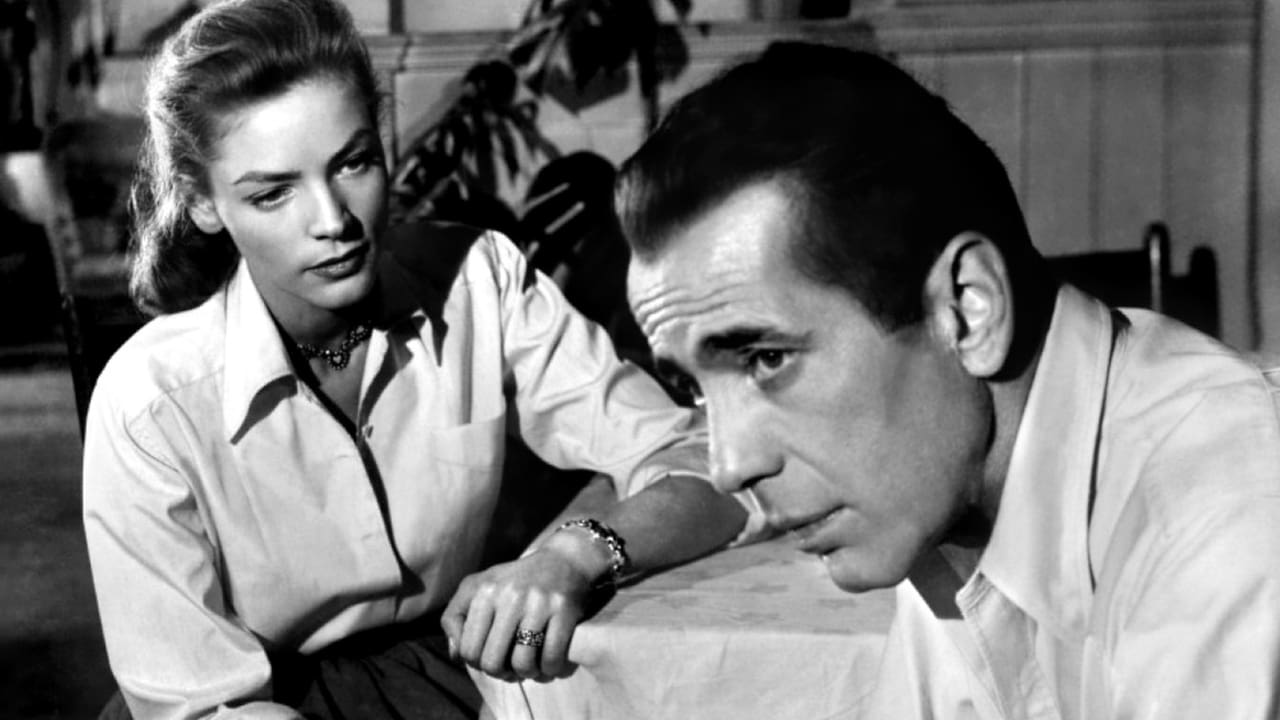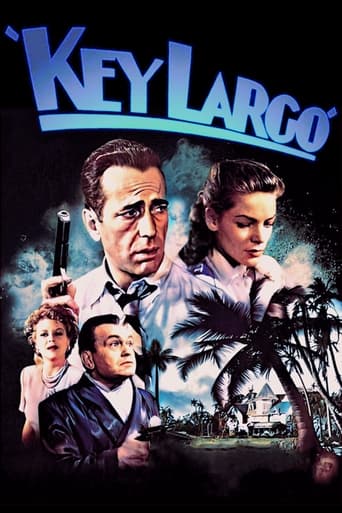

Save your money for something good and enjoyable
... View Morejust watch it!
... View Moreeverything you have heard about this movie is true.
... View MoreThis movie feels like it was made purely to piss off people who want good shows
... View MoreHumphrey Bogart, Lauren Bacall, Edgar Robinson, Lionel Barrymore. Key Largo in the middle of a hurricane. A gangster is using a dead WW2 vets hotel as a meeting point, and his shenanigans get Bogie, visiting his dead friends family, involved. A fast moving, excellent movie that still holds up today thanks to John Huston's brilliant directing.
... View More"Key Largo" is an American 100-minute movie from 1948, so this one will have its 70th anniversary next year. At this age, it is of course a black-and-white (sound) film. It is one of the more known works from the film noir genre and also by writer and director John Huston, who scored one of his many Oscar nominations for his work here briefly before winning twice in the same year. The main character is played by the legendary Humphrey Bogart, a man returning to a hotel to talk to a fellow soldier's girl about her late love and also to meet an old friends. But he finds a great deal of trouble there as gangsters have gained control over the place. As a result of that, almost the entire film is a hostage situation and with all the trouble inside, things outside are not looking much better as a dangerous hurricane is moving closer and closer.Bogart does a solid job overall, but it is a character that is not too demanding. The biggest letdown is Bacall here though, who already married to Bogart at that point. She plays the widow and honestly the film would have been the exact same without her, maybe even better as that moment when she looks at Bogart during the song is a bit cringeworthy. Shouldn't she be mourning her man instead? In general, the film lacks shades quite a bit. The characters are either 100% good people or 100% bad people with the exception of Claire Trevor. This may also have helped her in winning her Oscar here as she plays a character who is relatively close to the gangsters' boss, but has turned into a wreck of her former self because of alcohol, smoking and gambling. The moment she sings is only a brief return to her former glory days as she really only does it to get some booze as a reward. She really is the only one with some character development as we see her beg her boss not to leave her behind, but then she quickly becomes one of the good guys at the very end. This also shows that she wasn't really evil, but just a victim of her situation. I still have to see many more 1948 films to decide if she really is the best from that year.It's either her who is the most interesting character here or Edward G. Robinson's who dreams of bringing back the old days of crime and becoming truly influential again. But it is obvious he is really only strong thanks to his gun and has nothing that makes him an even match for Bogart's character. Even his henchmen do not seem to take him seriously all the time and maybe they still are the aftermath of the old days, but you can see them drifting apart too. Maybe it is the great deal of screen time and the question if he was lead or supporting that kept Robinson here from becoming an Oscar nominee too. A bit of a pity. As for the film itself, I would not rate it as highly as it stands here on IMDb, but it was a fairly interesting and tense watch from start to finish. Definitely worth checking out for those who love the old days of Hollywood, even if they probably did already. So maybe it is actually a good start for those who want to find out if this era in filmmaking is to their liking. It's a thumbs-up and I suggest you go for it.
... View Moresimple great. for performances, sure. but, in same measure, for the splendid atmosphere. who remains unique. because it is slice of a period.a period with its heroes, values and faiths. with its sensitivity and force of suggestion. a film who could reminds many roles of Bogart and Robinson and Bacall. and who reminds the great talent of Lionel Barrymore . a film of atmosphere, special in each aspect, impressive at whole, it is just a masterpiece.
... View MorePeople often criticize this movie for really not being much more than a filmed play. Yeah! So what's wrong with that when the characters are three dimensional and the actors are brilliant. This movie gets dull only when it moves out of the hotel (the stage) and becomes a traditional action movie. The black and white photography is brilliant (I once saw it colorized and it was dreadful). The production design is perfectly honest. The direction is so clear and unpretentious; when you have faces as brilliant as these, you gotta take advantage of closeups. There is not one less than outstanding performance. Bacall's role doesn't call for her to do a lot of "acting" and as a result, she is very moving. Trevor had tough competition for her Oscar that year and she won because she understood that too much restraint would have been wrong yet she never goes too far. Bsrrymore is unusually tough and commanding, almost heroic against the thugs. Bogart is quiet and direct and when he gives Trevor her drink has the most powerful moment in the movie. Robinson? It is a real showy role, and Edward knew what not to do. He is savage. And he almost is sexy when he gets Claire to sing her song but he can revert to a monster within seconds and give the audience chills. It really is his movie. Gomez and his fellow stupid thugs are funny at times but the script is unusually honest and barbaric. Take away their guns and these guys are wimps. But why didn't they just stay in the hotel? The shootout at the end could have been done that way. The escape to Cuba isn't believable or compelling. Those who call this movie slow, just don't get it. They don't understand that artists use pacing for effect. Today's generation loving special effects and action and over-the-top acting will hate this movie. Their loss. And the loss for the future of film and theatre.
... View More